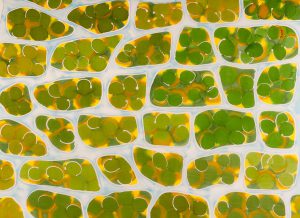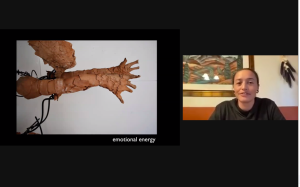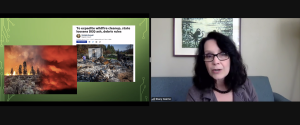
Odra Noel, Light wall moss leaf. Cellular level art, paint on silk, digitized. Wellcome Collection (CC BY-NC 4.0)
Ecomaterialism, the forum topic for 2021-22, focuses on the relationship between environment and materiality. It was once common to think of these terms as distinct. Where “nature” signified the physical world of plants, animals, landscapes, and other features of the earth, “materiality” named the matter and objects created and acted upon by humans. But recent scholarship has eradicated such distinctions, revealing how the entanglement of humans and other-than-human entities is crucial to understanding climate disaster. Ecomaterialism is an approach to material culture studies that asks us to consider the inextricable links between the many beings, objects, and substances that make up the physical world.
By bringing together material culture studies (especially new materialism) and the environmental humanities, ecomaterialism initiates an interdisciplinary conversation. Ecology, the branch of biology that deals with the relations of organisms to one another and to their physical surroundings, insists on the interconnectedness and entanglement of things. New materialism likewise stresses that interaction occurs between objects of all kind and explores matter as dynamic, agentic, and self-organizing. It holds that all human subjects are constructed and acted upon by the objects around them, but also considers the autonomous capacities of inorganic matter, technologies, and nonhuman organisms.
Ecomaterialism, then, names a paradigm in which the physical existence and flow of energy, materials, and resources is integral to an understanding of the environment. Moreover, ecomaterialism presents materiality as a potential strategy for converting environmental neglect into responsible stewardship. We can no longer think of material practices—production, consumption, the creation and disposal of waste—as divorced from the environment. Nor can we imagine that environmental concerns are divorced from issues of systemic racism, wealth inequality, imperialism and colonialism. Ecomaterialism demands that we recognize the relations and entanglements between people, possessions, and planet. As Stacy Alaimo and Susan Hekman write, “Nature is agentic—it acts, and those actions have consequences for both the human and nonhuman world.” (Material Feminisms, 4-5).
Through workshops, lectures, and site visits, participants in Thing Tank will explore ecomaterialism from various disciplinary angles. Could a more concerted effort to understand the ecology of matter help us address the existential threat of climate death? Can historical and new materialism illuminate the environment? How does ecological thinking teach us anew about our objects of study? How can we bring together the methods of the environmental humanities with those of material culture studies?
Thing Tank 2021-2022 Fellows:
- Prof. Kelly Cobb (Fashion & Apparel Studies)
- Prof. Carla Guerron-Montero (Anthropology)
- Prof. Kedron Thomas (Anthropology)
- Prof. Lance Winn (Art & Design)
- Sébastien Derenoncourt (Art)
- Kelly Fu (WPAMC)
- Gabby Johnson (Art History)
- Megan O’Donnell (English)
- Kyle VanHemert (History/Hagley)





